Media Theory, Digital Gardens, and What It Means for Video Production
- Tower View Media

- Nov 15, 2024
- 3 min read
Updated: 6 days ago
As a graduate of a media degree, I thought the last thing I’d be doing after university was thinking—even for a second—about media theory. All I wanted to do was grab a camera, film something, and get on with creating. Sure, I knew theory was a big part of my course, but I dreaded it, slogged through it, and celebrated when it was over.

So why am I now writing about theory on the blog page of the video production company I co-founded? Well, in a strange twist, I’ve realised that one of those ideas has become surprisingly relevant to the work we do today. And, dare I admit it, I’ve come to find it genuinely interesting.
Marshall McLuhan and the "Digital Garden"
One of the most enduring ideas I encountered back in those theory-heavy days came from Marshall McLuhan. He believed that the way we communicate—whether through TV, print, or the internet—shapes our thinking and creativity just as much as the actual content we share.

A key part of his theory was the idea of media as environments. McLuhan argued that each medium creates a "space" that we inhabit, influencing how we act and interact. The early days of the internet, for example, felt like a collection of individual "gardens." People created personal websites, blogs, and forums, tending their spaces with care and creativity.
Fast forward to today, and those personal gardens have largely given way to centralised platforms like TikTok, Instagram, and YouTube. These platforms act more like communal spaces, where algorithms, trends, and platform rules dictate much of what we create and share. While this has its benefits—massive audiences, for one—it also comes with challenges.
The Video Production Landscape Today
In video production, McLuhan’s ideas feel especially relevant. The environment we’re creating in isn’t neutral—it actively shapes how we tell stories.
The Short-Form Revolution: Platforms like TikTok and Instagram Reels prioritise quick, engaging videos, encouraging us to tell stories in seconds instead of minutes. While this pushes creativity, it also limits depth and nuance.
Algorithmic Pressures: Success on social media often depends as much on cracking the algorithm as it does on crafting a great video. When to post, how to hook viewers instantly, and what trends to follow are all decisions driven by the platform itself.
Loss of Ownership: Unlike the "gardener days" of the early internet, today’s creators don’t fully own their spaces. We create within ecosystems controlled by big platforms, leaving less room for personal expression or experimentation.

The Return of the Digital Garden
Despite these challenges, there’s a growing shift back toward the idea of digital gardening—creating personal, intentional spaces for connection and creativity. For video production, this might mean:
Owning Your Platform: Hosting videos on personal websites or using subscription services like Patreon to build direct relationships with your audience.
Balancing Platforms and Independence: Using social media for reach while maintaining creative projects outside the algorithm’s influence.
Thoughtful Use of New Tools: AI tools can streamline tasks, but using them to enhance creativity rather than replace it is key.
This shift represents a chance for creators to reclaim some of the freedom and authenticity that defined the early days of the internet while still embracing the massive opportunities of today’s platforms.

Wrapping Up
Marshall McLuhan’s idea that our tools shape our thinking feels just as true in 2024 as it did decades ago. The platforms we use for video production aren’t just neutral hosts—they shape what we make, how we make it, and who gets to see it.
But as the digital landscape evolves, there’s still room to carve out spaces where creativity and individuality thrive. Whether we’re working within the structured environment of a platform or building our own "digital garden," the opportunity to tell meaningful stories remains.
So, while I may not have appreciated media theory in my student days, it turns out it’s helped me understand the work we do today—and how we can push it forward tomorrow.








Comments